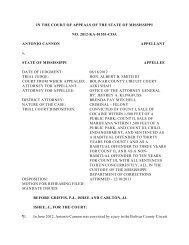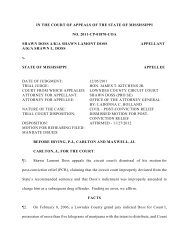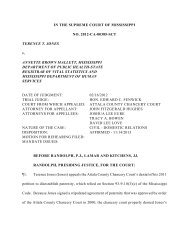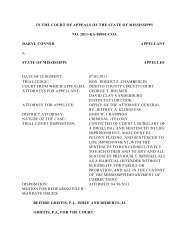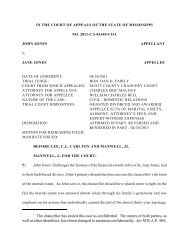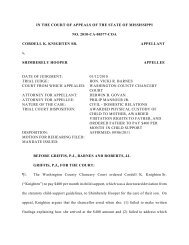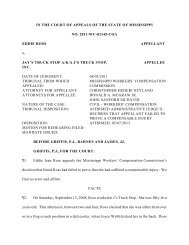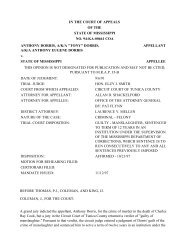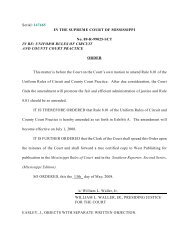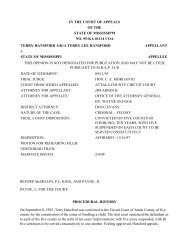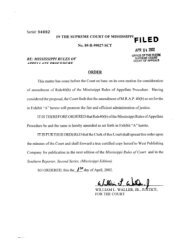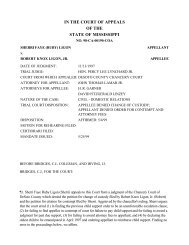98-KA-00656-COA - Mississippi Supreme Court
98-KA-00656-COA - Mississippi Supreme Court
98-KA-00656-COA - Mississippi Supreme Court
Create successful ePaper yourself
Turn your PDF publications into a flip-book with our unique Google optimized e-Paper software.
sufficiency of the evidence." Franklin v. State, 676 So. 2d 287, 288 (Miss. 1996). Appellant argues that<br />
there was insufficient evidence presented by the State to support a conviction of aggravated assault.<br />
8. When the trial court judges the legal sufficiency, as opposed to the weight of the evidence on a motion<br />
for a directed verdict, the trial court is required to consider evidence introduced in the light most favorable<br />
to the State and accept as true all of the evidence introduced at trial by the State, including all reasonable<br />
inferences that may be drawn therefrom. Yates v. State, 685 So. 2d 715, 718 (Miss. 1996) (citations<br />
omitted). Any evidence that is favorable to the defendant must be disregarded during the consideration of<br />
the trial court in determining whether to grant a motion. Id. at 718. (citations omitted).<br />
9. When the court is making a determination on whether to grant a judgment notwithstanding the verdict,<br />
the court is "not at liberty to direct that the defendant be discharged short of a conclusion . . . that given the<br />
evidence, taken in the light most favorable to the verdict, no reasonable hypothetical juror could find beyond<br />
a reasonable doubt that the defendant was guilty." Hicks v. State, 580 So. 2d 1302, 1304-05 (Miss.<br />
1991) (quoting Pearson v. State, 428 So. 2d 1361, 1364 (Miss. 1<strong>98</strong>3)). Additionally, in Hicks v. State,<br />
580 So. 2d 1302, 1305 (Miss. 1991), the <strong>Mississippi</strong> <strong>Supreme</strong> <strong>Court</strong> quoted from McFee v. State, 511<br />
So. 2d 130, 133-34 (Miss. 1<strong>98</strong>7), to repeat the standard which we as an appellate court are to apply in<br />
resolving the issue of whether the evidence is sufficient to sustain the jury's verdict:<br />
When on appeal one convicted of a criminal offense challenges the legal sufficiency of the evidence,<br />
our authority to interfere with the jury's verdict is quite limited. We proceed by considering all of the<br />
evidence -- not just that supporting the case for the prosecution -- in the light most consistent with the<br />
verdict. We give the prosecution the benefit of all favorable inferences that may reasonably be drawn<br />
from the evidence. If the facts and inferences so considered point in favor of the accused with<br />
sufficient force that reasonable men could not have found beyond a reasonable doubt that he was<br />
guilty, reversal and discharge are required. On the other hand, if there is in the record substantial<br />
evidence of such quality and weight that, having in mind the beyond a reasonable doubt burden of<br />
proof standard, reasonable and fair minded jurors in the exercise of impartial judgment might have<br />
reached different conclusions, the verdict of guilty is thus placed beyond our authority to disturb.<br />
(citations omitted).<br />
10. Under § 97-3-7 of the <strong>Mississippi</strong> Code Annotated (Supp. 19<strong>98</strong>), a person may be found guilty of<br />
aggravated assault if the State proves one of the following:<br />
A person is guilty of aggravated assault if he (a) attempts to cause serious bodily injury to another, or<br />
causes such injury purposely, knowingly or recklessly under circumstances manifesting extreme<br />
indifference to the value of human life; or (b) attempts to cause or purposely or knowingly causes<br />
bodily injury to another with a deadly weapon or other means likely to produce death or serious<br />
bodily harm . . . .<br />
11. At trial, a witness testified that prior to the altercation between Stephanie Clay and Herman Jackson he<br />
had observed Clay with two knives. One of the knives looked like a kitchen knife and the other knife was<br />
hooked, like a work knife. Additionally, the witness testified he had overheard Clay make the statement "if<br />
a mother 'F-er' 'F' with her tonight, she going to kill her a 'B'." The witness went on to explain that he was<br />
present at the Renaissance Lounge and witnessed Stephanie Clay stab Herman Jackson. Furthermore,<br />
Herman Jackson identified Stephanie Clay as his assailant. To reinforce Jackson's testimony there was the<br />
testimony of several officers who stated they witnessed Stephanie Clay and Jackson in an altercation. One



